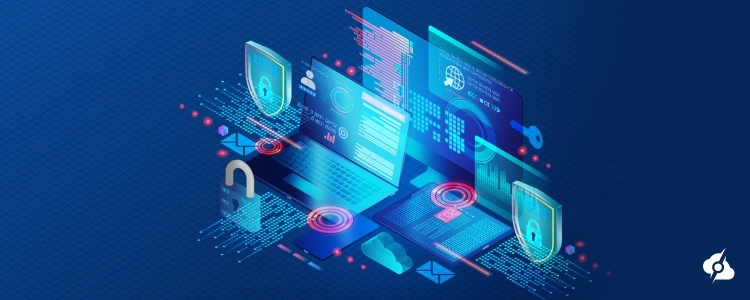Canadian Vs. American Data Privacy Laws | Complete Comparison Guide

Massive data breaches over the years are now raising some concerns across businesses and organizations handling sensitive data. To name a few we should mention the 2020 CAM4 leak compromising over ~10.88 billion records and the 2013 Yahoo incident affecting 3 billion user accounts.
In response, many businesses in 2025 are looking for a safe environment and countries such as Canada, recognized to have strict privacy, to migrate their data. This often leads to questions such as how do the data privacy laws in Canada compare with the ones in the United States?
In this article we will walk you through the main differences between Canadian and U.S. data privacy laws, to shed some light on why hosting data in Canada is appealing for businesses prioritizing trust and compliance.
See Also: GDPR Anniversary: Looking Back at One Year of Compliance
⚠️Disclaimer:
The information in this guide is purely educational and is subject to frequent changes. The information may not apply to your specific circumstances at the time of reading. It is not intended as legal advice from ServerMania or the author. For guidance tailored to your business, consult your legal counsel.
What is Data Privacy?
As concisely as possible, data privacy is the general concept that determines how organizations handle sensitive information, whether it’s user data or confidential documentation. At its core, data privacy ensures that businesses and individuals alike have full control and understanding of how their data is collected, why it’s required and how to completely remove it.
The data privacy laws that we’ll be discussing in this guide, lay the foundation of guidelines for collecting user data, securing it and enforcing penalties.
The definition of personal information depends on the specific laws in place but generally covers any details—factual or subjective—that can identify an individual.
| Personal Identifiers | Name, age, ID numbers, blood type | Basic details that directly identify an individual, such as passport numbers or driver’s licenses. |
| Demographic Information | Income, ethnic origin, social status | Data reflecting an individual’s background or socioeconomic position, often used for profiling or analytics. |
| Opinions and Evaluations | Comments, disciplinary actions, performance reviews | Subjective information, including feedback or assessments, that may impact reputation or opportunities. |
| Financial and Employment Records | Employee files, credit records, loan records | Sensitive records detailing financial history or workplace performance, critical for privacy protection. |
| Medical and Health Data | Medical records, health conditions | Private health-related information requires strict safeguards due to its sensitive nature. |
| Consumer Interactions | Disputes with merchants, purchase intentions | Records of commercial activities or plans, such as intent to buy goods or switch jobs, often collected for marketing. |
These categories highlight the broad scope of personal information, which businesses must handle responsibly to comply with local laws and build trust with customers.

Why Is Data Privacy Critical?
Data privacy is critical for businesses because shady privacy practices can quickly erode the customer’s trust, as we’ve seen in major breaches like the ones that exposed billions of records. When companies fail to protect data, it doesn’t just hurt their reputation—it can affect them so badly, ending up in massive customers lost and costly lawsuits.
Here at ServerMania we believe that prioritizing data privacy should be the highest priority for any business or organization, treading personal information is if it’s our own.
We focus on being completely transparent regarding where data is stored, what’s collected, and how it’s secured, which helps us avoid the kind of breaches that make headlines. This is where the data privacy laws outline a clear roadmap, helping us build customer confidence and loyalty.
Complying with these regulations is not about avoiding fines, (which can be steep in places like Canada or the U.S.); it’s about showing clients that you care about their security and privacy.
Steps Making Privacy Our Priority:
Here are some practical steps businesses can take to make data privacy a priority:
- Auditing Collection:
We regularly evaluate the personal information we collect and verify that we are only retrieving what’s necessary for our operations.
- Strengthening Safety:
ServerMania uses ultimate encryption measures and secure storage to safeguard data from unauthorized access, breaches and hackers.
- Training Employees:
We strictly educate our employees on the core privacy principles to prevent accidental leaks, misuse or mishandling data.
- Staying Compliant:
ServerMania keeps up with local privacy laws to avoid fines and align with best practices available.
- Being Transparent:
We clearly showcase to our customers how their data is used and protected, being transparent and trustworthy.

Types of Data Privacy Laws:
The privacy laws concerning personal information come in different types, each of which is deployed to strictly protect your data.
| Type | Description | Application |
Tort Law | Covers civil wrongs, allowing individuals or organizations to sue for privacy violations, such as unauthorized access to personal data. | A customer sues a bank employee for accessing their financial records without authorization, seeking damages under “intrusion upon seclusion” laws. |
Healthcare Privacy | Regulates how healthcare providers and organizations collect, store, and manage sensitive health information to protect patient confidentiality. | Hospitals implement strict access controls to ensure only authorized personnel view patient medical histories, complying with health privacy regulations. |
Financial Privacy | Governs how banks and financial institutions handle personal and business financial data, ensuring secure and ethical management. | Banks use encryption and obtain explicit consent before sharing customer transaction data, adhering to financial privacy standards. |
Digital Privacy | Focuses on how organizations collect, store, and use online data, including obtaining customer consent and securing digital records. | E-commerce platforms disclose data collection practices and offer opt-out options for cookies, aligning with digital privacy requirements. |
See Also: 4 Reasons Why Montreal, Canada is a Great for Businesses to Store their Data

Canadian Vs. American Data Privacy Laws
Understanding the difference between the Canadian and U.S. data privacy laws is critical for any businesses or organizations handling sensitive data.
The great contrast is recognizable when we compare Canada’s unified approach against the United States’ mix of federal or state regulations.
So, the section below compares the key frameworks in both countries, helping you understand why many businesses choose Canada’s robust privacy standards.
What Laws Govern the U.S. Data Privacy?
Contrasting Canada’s data privacy approach, the U.S. lacks a single, nationwide data privacy law, that exposes businesses to navigate complex regulations.
At the state level, privacy laws vary widely—California, for instance, has robust regulations like the CCPA, while other states may have minimal protections, forming challenging circumstances for businesses managing data across jurisdictions.
The Federal Trade Commission (FTC) is responsible for the cybersecurity nationally, enforcing rules against unfair or malicious practices.
Meanwhile, several federal laws address specific aspects of data protection, as shown below:
| Federal Law: | Description: |
| Cybersecurity Act of 2015 | The Cybersecurity Act of 2015 prevents cyber threats by allowing fast and accurate responses to data breaches. |
| Electronic Communications Privacy (ECPA) | ECPA safeguards data exchange such as emails from intruder access, laying down the fundamental rules for communication service providers. |
| Computer Fraud and Abuse Act (CFAA) | CFAA deploys penalties for unauthorized access to systems, which mainly targets theft motivated by malicious intents. |
| Economic Espionage Act | The Economic Espionage Act protects digital data against digital crimes and cyberattacks. |
What Laws Govern Canadian Data Privacy?
In Canada, there are two major laws that protect data on both federal and provincial level:
Federal Laws:
The Canadian data privacy law that is applicable to most businesses is the Personal Information Protection and Electronic Documents Act (PIPEDA).
This law generally applies to:
- All for-profit businesses in Saskatchewan, Manitoba, Ontario, New Brunswick, Newfoundland, and the territories
- The personal information of employees of federally-regulated businesses (banking, aviation, etc.)
Note:
Businesses operating in Alberta, British Columbia, or Québec are not affected by the PIPEDA because they comply with their old legalisation system.
| Core Principles of PIPEDA | |
| Accountability | Appoint a privacy officer to ensure the business complies with PIPEDA’s rules. |
| Purpose Identification | Clearly state why personal data is being collected before or during the process. |
| Consent | Get an individual’s informed permission before collecting their personal information. |
| Collection Limits | Collect only the personal data absolutely necessary for the stated purpose. |
| Limit, Disclosure, and Retention | Use data only for its intended purpose, keep it no longer than needed, and avoid sharing it with third parties. |
| Accuracy | Keep your customer’s personal data correct, 100% complete, and up to date by regular renewals. |
| Safeguards | Protect customer information with strong security measures to avoid unauthorized access. |
| Openness | Make the data collection system and usage policies clear and accessible to the public. |
| Access | Allow all individuals to freely view and correct their personal data upon manual request. |
| Compliance | Let individuals question an organization’s compliance through its privacy officer. |
Provincial Laws:
Some provinces have passed data privacy laws in relation to health and financial data. For example, Ontario has the Personal Health Information Protection Act and Alberta has the Personal Information Protection Act for employment data.
How do Canadian and U.S. Data Privacy Laws Compare?
It’s obvious that the Canadian data privacy laws are much stricter than the United States, even though progress is being made on a state level.
In conclusion, we can easily say that the Canadian’s unified approach is better because:
- Businesses can easily identify which legalisation applies to them.
- Organizations can easily comply with unified straightforward laws.
- Clients are provided with transparency, rather than relying on laws.
- The data obligations are better defined and not regularly changed.
In short, those are the reasons why we are seeing more and more businesses migrating data from the United States to Canada.
How to Choose A Location for Your Business?
Now that you’re familiar with the data privacy laws, you may be wondering which is the best location for your business operations. It depends on several factors:
- Where is your organization located?
- Where are your customers located?
- How important is privacy for your businesses?
It’s crucial to consider these factors when choosing a location for your business in order to help you grow, scale and thrive.
ServerMania’s dedicated hosting solutions, powered by Tier III and IV data centers in Montreal, New York, Los Angeles, London, and Amsterdam, ensure high-performance and compliance with strict privacy laws like PIPEDA and CCPA.
In addition, our colocation services offer secure, scalable space for your servers, while managed services provide 24/7 expert support to keep your infrastructure running smoothly. Discover how ServerMania can empower your business today, by booking a free consultation with an expert

Further Reading
If you’re interested in learning more about data privacy laws, take a look at the Office of the Privacy Commissioner’s Summary of Privacy Laws in Canada. The office has also prepared a PIPEDA In Brief document.
You can also view a listing of every privacy law in each state on Wikipedia!
Was this page helpful?

